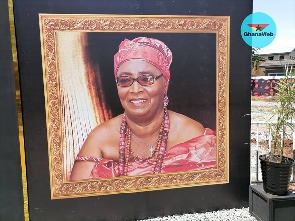 Ga Manye, Naa Dedei Omaedru III
Ga Manye, Naa Dedei Omaedru III
It is an important day in Accra, for the Ga traditional council and ethnic group in Ghana. The burial and funeral rites of the late Naa Dedei Omaedru III, the Ga Manye (Ga Queen), in consonance with the traditional rites of the people of Ga State are currently underway in Ghana’s Capital, Accra. The Ga-Dangmes are one ethnic group that lives primarily in the Greater Accra of Ghana.
The late Queen Mother was born in 1934, enstooled in 1963, and died on December 26, 2022. Her Royal Majesty, Naa Dedei Omaadru III is believed to be the longest-serving queen mother of the Ga people. She reigned for 60 years, just ten years less than the late Queen Elizabeth II of the United Kingdom.
The Spokesperson for the Ga Traditional Council, Mr. Sylvester Parker Allotey is reported by GhanaWeb, to have earlier communicated arrangements for the funeral rites. As part of the announcement, all commercial activities within the Greater Accra region of Ghana on October 28th, 2023 were to be suspended, and a curfew to be imposed as a mark of solemn respect and final farewell to the late Queen Mother.
Indeed, and in reverence to the Ga people, and their late Queen mother, shops, businesses, and major markets in the nation’s commercial center closed down, and one could easily hear a pin drop in the busiest of places in the Greater Accra region. Companies both local and foreign who operated on weekends went on break in compliance with the directive.
Beyond just the celebration of the impactful life of this great traditional leader, this article reveals 3 main ways Ghana missed a unique Opportunity for Nation-Building and Development, vis-à-vis the ongoing funeral of the Queen Mother.
The 3 Big Missed Factors/Opportunities for Nation Building and Development
1, First, Ghana probably would have been more united under a traditional/monarchical system just like Great Britain. The Greater Accra region is one of the most populous regions in the country and probably the most heterogeneous in terms of ethnicity, religion, and political ideologies among others. But despite this diversity, we have witnessed how the region of over 5 million people has respected the traditions and culture of just one ethnic group. At the funeral grounds, we also witnessed the representation of different political parties and their leaders.
Truly, one can argue that the monarchical system (united factor) of the United Kingdom has contributed enormously to its socio-economic development. We can only imagine how united the people of Ghana would have become on issues affecting the country if the country evolved through history to eventually have a monarchy with a blend of modern state rule.
Unfortunately, Politics has woven deep into the fabric of Ghanaian society and destructed its people from pursuing their common enemies: Poverty, hunger, sicknesses, security, and natural disasters, among others.
2. Secondly, Ghana’s governance structure built on traditional/ monarchical rule could have accorded the nation continuity in the implementation of some development policies. Many development experts and research have proven that countries that can implement policies continuously do well more than those with policy discontinuity.
The late Naa Dedei Omaadru III’s 60 years of reign was known to have been characterized by many developmental projects, championing important issues crucial to peace, education, and opportunities for young people, especially the girl-child.
Again, unfortunately, since the independence of the country in 1957, Ghana has witnessed different governments formed by different political parties, mostly pursuing different development policies.
3. Ghanaians seem to respect and resonate with their own culture, and traditional leadership systems more than the modern state governance arrangements. And we could have easily leveraged that for effective governance and socio-economic development. For instance, some ethnic groups forbid hunting and farming in the forest on some days and periods of the year. For others, it is even taboo for a farmer or hunter to kill animals that are young, pregnant, or fending for their young ones. Traditionally, these regulations have mostly received the highest compliance from the Ghanaian people.
We saw a stack contrast three years ago. In March 2020, during the COVID-19 outbreak, Ghana imposed lockdowns in the Accra and Kumasi districts in an attempt to limit community transmission of the new coronavirus. However, it was reported widely in news and social media how members of the public found ways to evade the restrictions, making them ineffective.
There are definitely other ways Ghana could have benefited if we protected and guided our traditional governance systems.
What do you think, would Ghana have been better off under a monarchical system similar to Great Britain? How can we effectively leverage the current diverse traditional systems of the country to champion nation-building and socio-economic development?